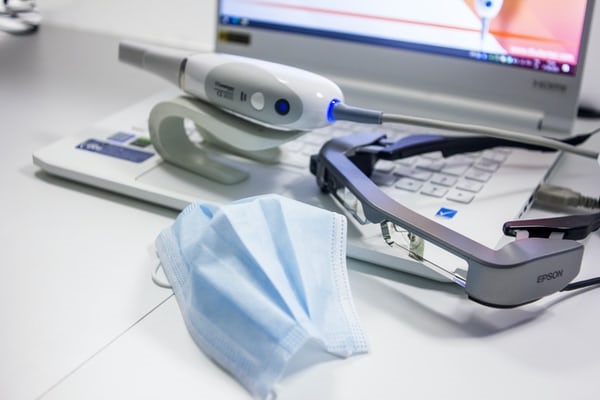- 12 August, 2025
- Artificial intelligence in dentistry
- Please select
-

In September 2024, the GDC commissioned a Rapid Evidence Assessment (REA) to explore how artificial intelligence (AI) is currently being used in dental service provision and to consider its potential implications for dental professionals, patients and the wider sector.
The research was carried out by a team from Peninsula Dental School at the University of Plymouth, supported by subject specialists in AI and robotics. It followed an established rapid review methodology and forms part of the GDC’s wider horizon scanning work on emerging technologies and their potential impact on dental regulation and practice.
Aims and Scope
The REA focused on identifying and synthesising international evidence from 2020 onwards to understand:
- The current use of AI in live dental service delivery.
- Its benefits, risks, and challenges, including implications for equality, diversity and inclusion (EDI) and data protection.
- Areas of future development in AI applications.
- Methods used to evaluate the role and impact of AI.
- Gaps in the evidence base and priorities for future research.
Methodology
The review screened over 3,800 studies, with 114 assessed at full-text stage. A total of 45 studies met the inclusion criteria, all involving real-world use of AI in patient care. These included:
- 18 case reports or series (mainly small-scale)
- 13 clinical trials (including pilot and RCTs)
- 6 cohort studies
- 4 cross-sectional studies
- and a small number of surveys, observational and experimental studies.
Most research originated from China (18 studies) and the USA (13), with smaller contributions from India, Italy and several other countries. No UK-based studies were identified.
Key findings:
On usage, the review found that most of the current applications of AI in dentistry fall into three categories:
- Robotics, particularly in implant surgery, where systems such as the Yomi robot are being used to assist with precision placement.
- Deep learning, used for remote monitoring and caries detection through smartphone apps that analyse intraoral images.
- Supervised machine learning, with applications in paediatric dentistry, such as predicting and identifying early childhood caries.
While the research indicates promising benefits of AI, including improved accuracy, enhanced patient outcomes, and opportunities for remote care, it also highlights some challenges and risks. These include the risk of using robotics in implant surgery for patients with poor bone quality, training needs for professionals, and potential patient concerns such as anxiety during robot-assisted procedures or difficulties using AI tools effectively at home.
The review shows that, despite growing interest and technological advancements, real-world implementation of AI in dental services remains limited. Significant gaps exist in the evidence relating to best practice guidelines, large-scale trials, UK-specific applications, ethical considerations, data protection, and the impact on equality, diversity and inclusion.
 eGDC
eGDC